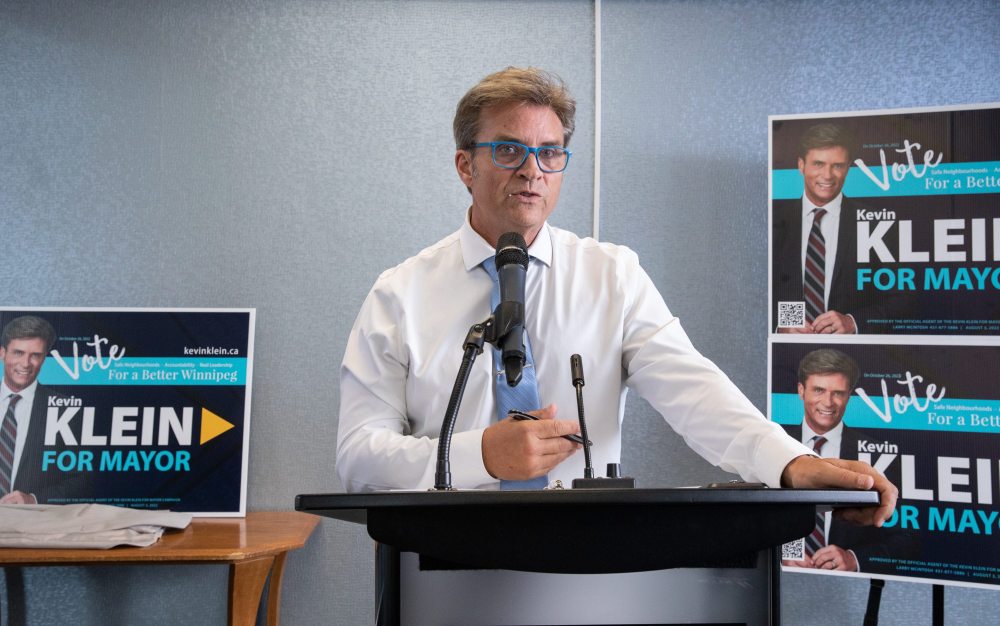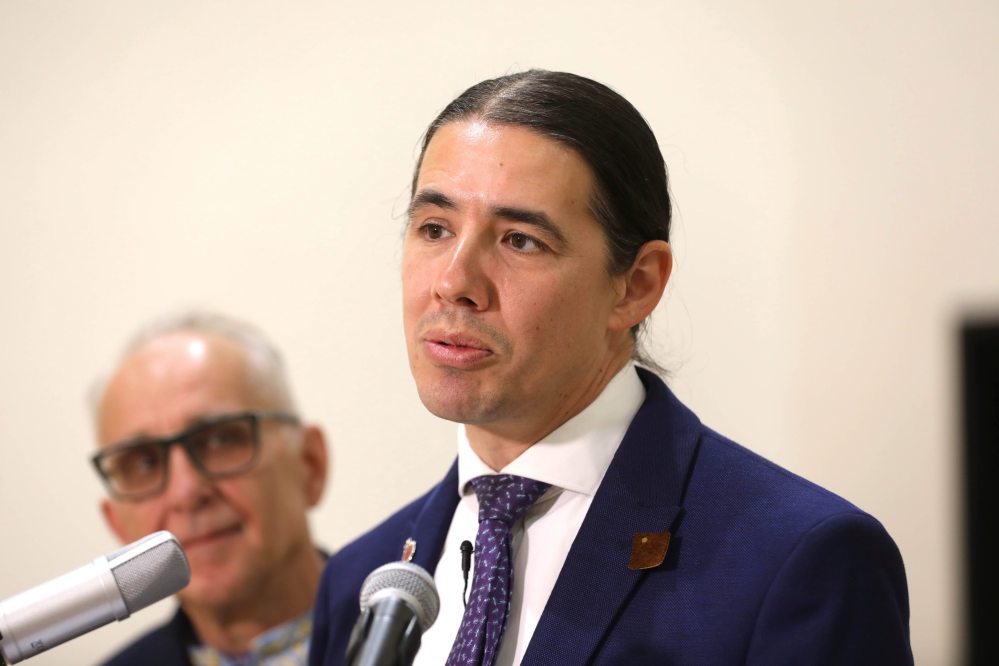Mayoral candidates make infrastructure, rail yard study, derelict property pitches
Advertisement
Read this article for free:
or
Already have an account? Log in here »
To continue reading, please subscribe:
Monthly Digital Subscription
$0 for the first 4 weeks*
- Enjoy unlimited reading on winnipegfreepress.com
- Read the E-Edition, our digital replica newspaper
- Access News Break, our award-winning app
- Play interactive puzzles
*No charge for 4 weeks then price increases to the regular rate of $19.00 plus GST every four weeks. Offer available to new and qualified returning subscribers only. Cancel any time.
Monthly Digital Subscription
$4.75/week*
- Enjoy unlimited reading on winnipegfreepress.com
- Read the E-Edition, our digital replica newspaper
- Access News Break, our award-winning app
- Play interactive puzzles
*Billed as $19 plus GST every four weeks. Cancel any time.
To continue reading, please subscribe:
Add Free Press access to your Brandon Sun subscription for only an additional
$1 for the first 4 weeks*
*Your next subscription payment will increase by $1.00 and you will be charged $16.99 plus GST for four weeks. After four weeks, your payment will increase to $23.99 plus GST every four weeks.
Read unlimited articles for free today:
or
Already have an account? Log in here »
Hey there, time traveller!
This article was published 21/09/2022 (1174 days ago), so information in it may no longer be current.
Mayoral candidate Kevin Klein is promising, if elected, to create a $2-million infrastructure plan to prioritize Winnipeg road and sewer projects — with the goal of removing politics from such decisions.
Klein said Wednesday an advisory board of industry experts would help determine which projects must happen first, ranking them by merit, instead of letting politicians select certain ones “to buy votes.”
“We need to take the politics out of our road maintenance and renewal… We will receive input so that we can make decisions based on priorities and knowledge.”
While the City of Winnipeg typically relies on provincial and federal funding to help pay for major infrastructure projects, Klein said he’s confident senior governments would devote their dollars to locally selected priorities, especially ones that target aging infrastructure.
JESSICA LEE / WINNIPEG FREE PRESS FILES Kevin Klein is promising, if elected, to create a $2-million infrastructure plan to prioritize Winnipeg road and sewer projects.
“I think when we go to them with information put together by experts that show that ‘this is a priority in our city, for our infrastructure,’ I cannot imagine any level of government saying no to that… We don’t want a bridge collapsing on us and I’m sure the federal and provincial governments don’t want that either,” he said.
If elected Oct. 26, he pledged to push the city to explore more options for public-private partnerships on infrastructure projects, along with ways to speed up emergency repairs for sinkholes and other dangerous road failures.
Klein also vowed to enhance penalties for city contractors who fail to meet project deadlines and rewards for those who complete work on time.
Relocating, repurposing rail lines: Ouellette
Meantime, mayoral contender Robert-Falcon Ouellette is calling for an extensive study on moving key railway lines outside of the city. That study would also explore whether existing rail rights-of-way could provide new commuter options, possibly replacing current plans for bus rapid transit additions.
RUTH BONNEVILLE / WINNIPEG FREE PRESS FILES Robert-Falcon Ouellette is calling for an extensive study on moving key railway lines outside of the city. That study would also explore whether existing rail rights-of-way could provide new commuter options.
He expects the study itself would cost about $1 million.
“For anyone who has wanted better transit in Winnipeg, for commuters who get stuck waiting for freight trains and for taxpayers who are paying the tab, we have an obligation to see whether we could be doing better,” Ouellette said Wednesday.
The idea of rail relocation has been debated for years, including provincial plans for a study that were cancelled in 2016.
At the time, critics deemed moving rail lines too expensive, citing estimates it could hundreds of millions of dollars, if not more. However, Ouellette said the investment could also potentially alleviate the need for equally expensive underpasses and rapid transit routes.
Related coverage
“Do we want to spend those billions of dollars working around the problem or actually solving it?”
The candidate said he’s hopeful Ottawa would cover most of the study’s cost, due to its role as a rail line regulator, and the provincial government would be open to help fund a credible plan for rail relocation, should one be devised.
“Turning the rail yards into The Forks was one of the best things the city and the province has ever done. We could see that kind of transformation again,” said Ouellette.
Derelict property seizures: Motkaluk
Also Wednesday, mayoral contender Jenny Motkaluk promised to crack down on derelict properties by having the city seize as many of them as possible.
“I understand that there are legal barriers to it, (but) I’m going to seize every single one that we have the capability of seizing,” said Motkaluk.
Under current rules, the City of Winnipeg can take title to a vacant building without compensating the owner, once that owner is convicted under the provincial offences act for “continued non-compliance” with a vacant building bylaw order. This process typically takes about 10 months and is guided by provincial legislation.
While Motkaluk didn’t have a set timeline for how fast she’d want to seize the properties, she said many have sat empty for years, often becoming “magnets” for fire, rodents and crime. Due to that disruption, it would be worth lobbying the province to let the city takeover properties more easily, she said.
MIKAELA MACKENZIE / WINNIPEG FREE PRESS FILES Jenny Motkaluk promised to crack down on derelict properties by having the city seize as many of them as possible.
“If we need to make changes to (the process) we will because derelict housing is too expensive for all the rest of Winnipeggers. The cost to the community is too much.”
As of Sept. 20, vacant building bylaws are being enforced at 622 properties in Winnipeg, officials confirmed Wednesday. Motkaluk said there is great potential to reuse hundreds of those properties to provide affordable housing, promising to share more details of that proposal Thursday.
The civic election will take place Oct. 26. Eleven candidates remain in the mayoral race.
joyanne.pursaga@freepress.mb.ca
Twitter: @joyanne_pursaga

Born and raised in Winnipeg, Joyanne loves to tell the stories of this city, especially when politics is involved. Joyanne became the city hall reporter for the Winnipeg Free Press in early 2020.
Our newsroom depends on a growing audience of readers to power our journalism. If you are not a paid reader, please consider becoming a subscriber.
Our newsroom depends on its audience of readers to power our journalism. Thank you for your support.





